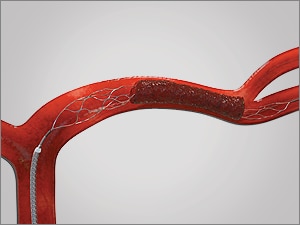August 13, 2012 — The US Food and Drug Administration (FDA) has granted 510(k) market clearance for the Trevo Pro Retriever (Stryker Neurovascular), a clot retriever used in the setting of acute ischemic stroke.
Approval was based on the results of the TREVO 2 trial presented at the 2012 European Stroke Conference in May, where it compared favorably on rates of revascularization vs the currently available Merci Retriever, also a Stryker product.
 |
Trevo Pro Retriever (Stryker Neurovascular)
|
"The launch of this device is another great stride in the evolution of stroke care," TREVO 2 investigator Gary Duckwiler, MD, from the University of California, Los Angeles, Medical Center, said in a statement released today by the company. "Concentric Medical, which is now owned by Stryker, has a long history of partnering with physicians to develop devices specifically designed to remove blood clots from a blocked artery in the brain. The Trevo Pro Retriever is easy to use and very effective at opening blood vessels, allowing physicians to have a significant impact on clinical outcomes."
TREVO 2
TREVO 2 was a randomized, core laboratory adjudicated clinical trial that compared the safety and efficacy of the Trevo retriever against that of the Merci Retriever. The new retriever uses the company's patented "Stentriever" technology, which the company describes as a novel method to retrieve clots from the neurovasculature.
The trial enrolled 178 patients from 27 institutions in the United States and Europe. The new retriever achieved significantly better post-device revascularization, with 86.4% of patients revascularized with the Trevo device vs 60% with the Merci Retriever, the company noted in a release in May.
Rates of functional independence, defined as a modified Rankin Scale score of 2 or less, were also higher with the Trevo device at 40% vs 21.8% with the Merci device. Other measures favored the Trevo device, including National Institutes of Health Stroke Scale scores and length of hospital stay.
Solitaire Device
The Trevo device is the second retriever approved this year, after 501(k) clearance was granted to the Solitaire Flow Restoration device (Covidien) in March.
Approval of that device was based on results of the Solitaire With the Intention for Thrombectomy (SWIFT) trial, which also compared the Solitaire device against the Merci Retriever.
Although SWIFT was a noninferiority trial, the results demonstrated superiority with the new retriever on several outcomes, said principal investigator Jeffrey L. Saver, MD, professor of medicine and director of the Stroke Center at the Geffen School of Medicine at the University of California, Los Angeles, when the trial was first presented at the International Stroke Conference in February 2012.
The results were reported by Medscape Medical News at that time.
Comments
Post a Comment